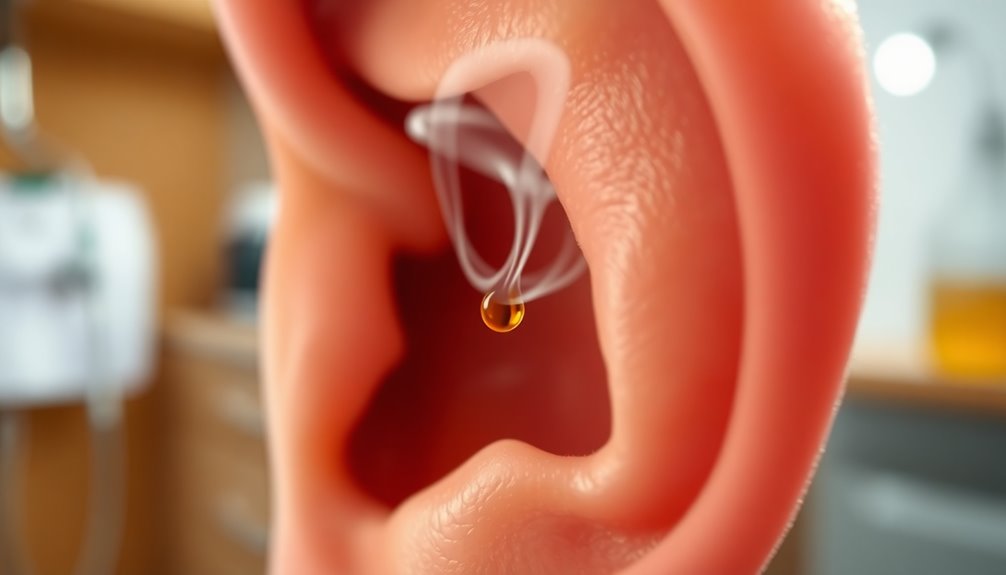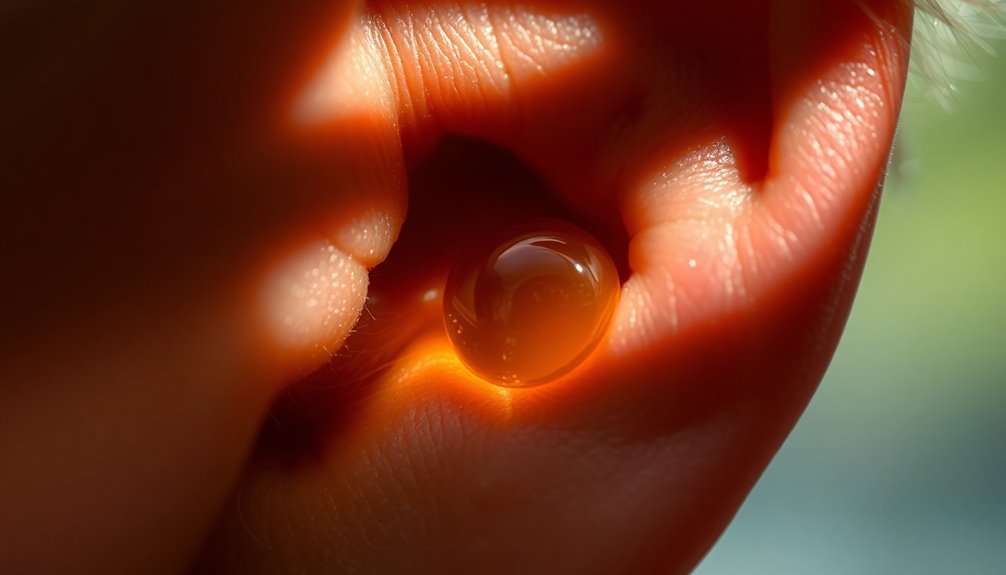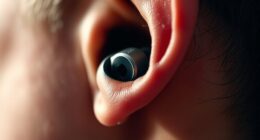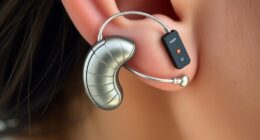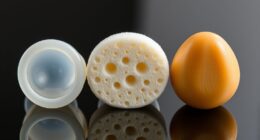If your earwax smells like vinegar, it's likely a sign of an underlying health issue, often an ear infection. This odor can result from bacterial or fungal growth, producing acidic byproducts that create that vinegary scent. Other factors like diet or skin conditions may also influence your earwax's odor. Pay attention to other symptoms such as earaches or discharge, as these could require medical advice. Neglecting this issue might lead to more serious complications. Stick around to discover more about earwax health and effective prevention strategies!
Key Takeaways
- A vinegar-like smell in earwax often indicates an underlying ear infection caused by bacteria or fungi.
- Accumulated earwax can trap moisture, promoting bacterial growth and resulting in unpleasant odors.
- Dietary factors, especially vinegar-rich foods, can alter the composition and scent of earwax.
- Skin conditions like eczema may change earwax's chemical makeup, contributing to unusual odors.
- If earwax smells like vinegar, it's essential to seek medical evaluation for potential infections or health issues.
Understanding Earwax Composition
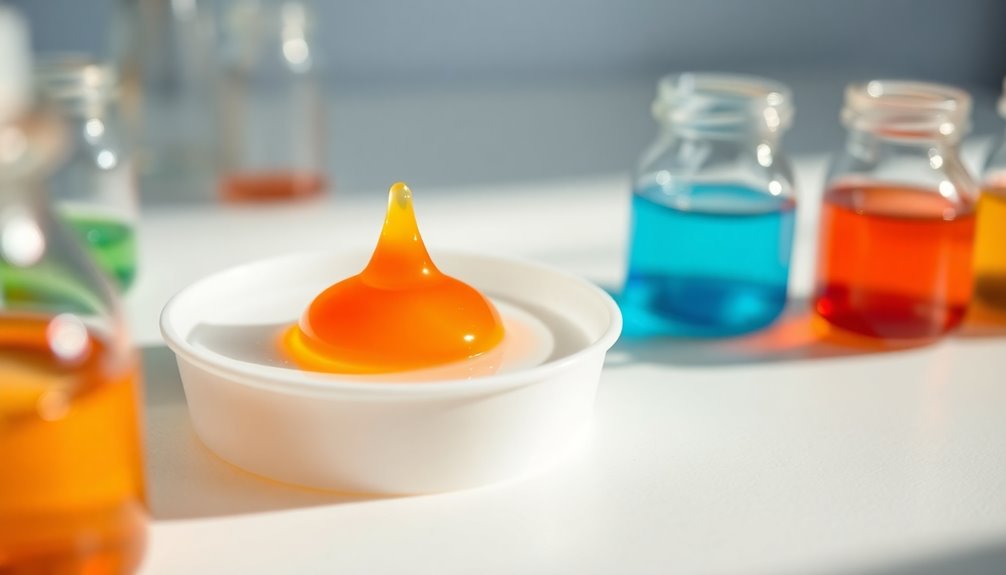
Understanding earwax composition reveals its fascinating role in ear health. Scientifically known as cerumen, earwax consists of secretions from sebaceous and ceruminous glands, along with dead skin cells and environmental debris.
This unique composition serves multiple vital functions. It lubricates the ear canal, traps dust and foreign particles, and acts as a barrier against infections.
The pH level of earwax, typically ranging from 6.0 to 7.0, contributes to its slightly acidic nature, enhancing its antibacterial properties. You might notice that the composition and consistency of earwax can differ from person to person, influenced by genetics, environmental factors, and overall health.
While normal earwax usually has a slightly sweet or musty smell, changes in its color or odor can signal underlying health issues. So, if you ever notice a change in your earwax's smell, it's worth paying attention to.
Taking care of your ear health includes understanding the significance of earwax composition, as it plays a vital role in protecting your ears and maintaining overall well-being.
Common Causes of Smelly Earwax
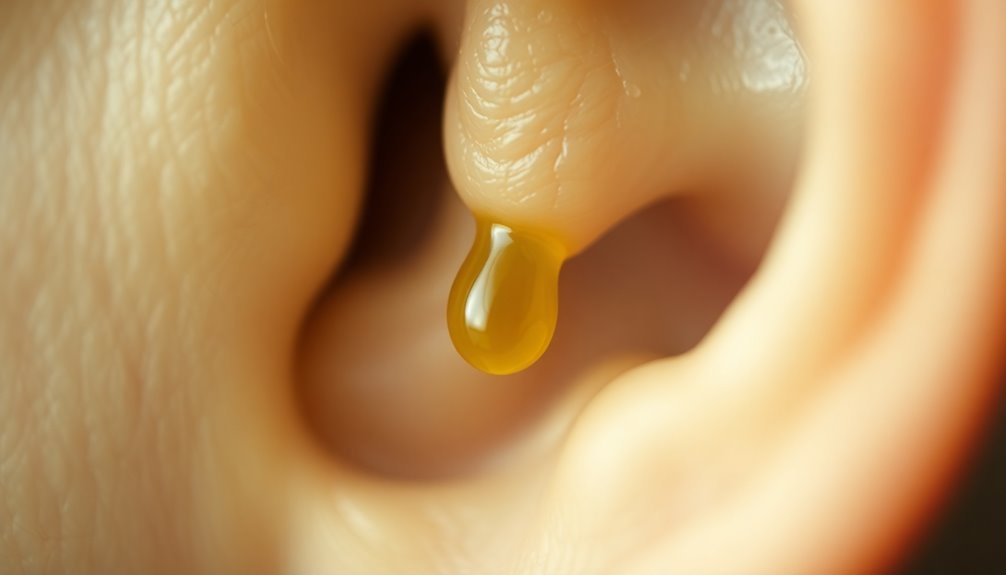
Changes in earwax odor can often signal underlying issues, and a vinegar-like smell is no exception. One common cause of smelly earwax is an ear infection, which can arise from bacteria or fungi. These infections produce acidic byproducts, resulting in that pungent scent.
If you're experiencing accumulated earwax due to improper cleaning habits or lifestyle choices, it can trap moisture and debris. This environment is ideal for bacterial growth, leading to unpleasant odors.
Diet can also play a role. If you consume vinegar-rich foods, it might alter the composition and smell of your earwax, making it even more pungent.
Skin conditions like eczema or dermatitis may change the chemical makeup of your earwax, contributing to that vinegar-like odor.
Lastly, if you have impacted earwax or a foreign object lodged in your ear, this can irritate the ear canal and lead to infections. The resulting smelly earwax may resemble vinegar in scent, signaling that it's time to pay attention to your ear health.
Always consult a healthcare professional if you notice persistent changes in earwax odor.
Recognizing Symptoms of Ear Issues
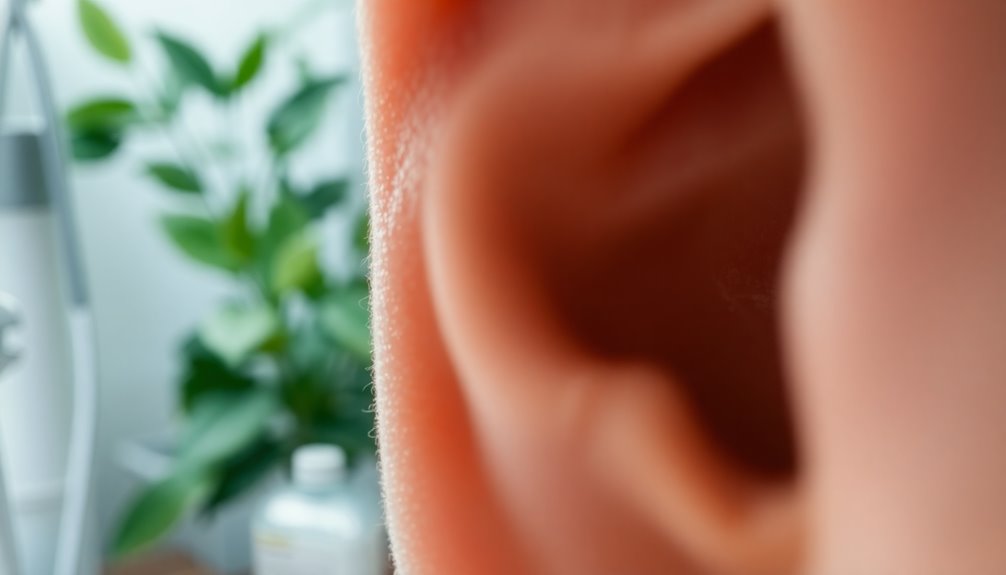
You might frequently notice symptoms indicating ear issues, especially if your earwax has an unusual odor. If your earwax smells like vinegar, it could be a sign of an underlying ear infection. Pay attention to any accompanying symptoms like earaches, discharge, or drainage from your ear. These indicators are essential for determining if you need medical attention.
You should also watch for difficulty hearing or a sensation of fullness in your ear. These can signal excessive earwax buildup, which may require evaluation. In children, tugging at the ear or increased irritability can point to ear problems related to smelly earwax or infections.
Dizziness or a feeling of pressure in your ear are other symptoms to take seriously. Regularly monitoring your earwax smell and any associated symptoms can help you catch potential ear health issues early.
If you notice any of these signs, don't hesitate to consult a healthcare professional. Timely intervention can prevent complications and maintain your ear health intact. Stay proactive about your symptoms and keep your ears in top condition!
The Role of Diet in Earwax Odor
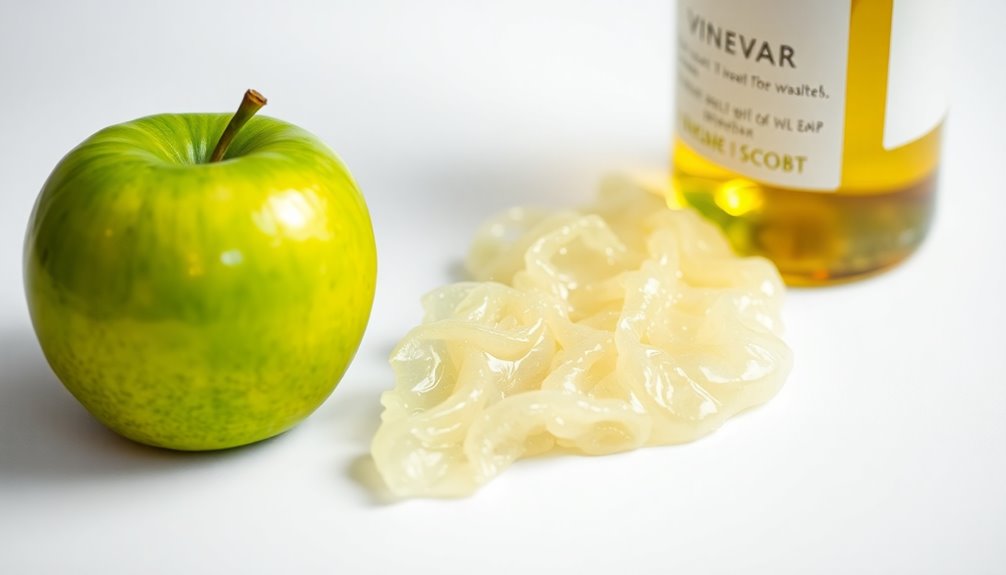
Diet plays an essential role in how your earwax smells, and certain foods can really ramp up that odor. If you consume a lot of sulfur-rich foods like garlic and onions, you might notice a more pungent smell in your earwax, potentially resembling vinegar.
Spicy foods can also play a part, as they increase sweat production and alter your body chemistry, leading to changes in earwax composition and smell.
On the flip side, a diet high in processed foods and sugars can disrupt your body's pH balance, impacting the odor of your earwax. Nutritional deficiencies, particularly in vitamins A and E, can affect ear health and the natural smell of your earwax as well.
To keep your earwax odor in check, stay hydrated. Proper hydration helps maintain the consistency of your earwax, potentially minimizing any unpleasant odors linked to dehydration.
When to Seek Medical Attention
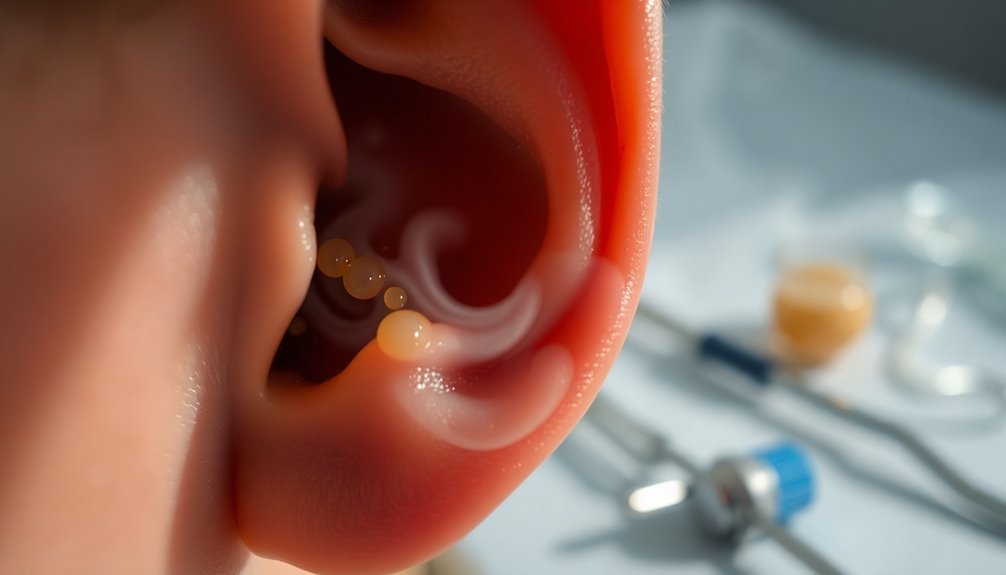
When should you consider seeking medical attention for earwax that smells like vinegar? If you notice a strong vinegar-like odor, it could indicate an underlying infection or other health issues that need evaluation.
It's essential to pay attention to accompanying symptoms. If you're experiencing earache, difficulty hearing, or drainage along with the unusual earwax smell, don't hesitate to consult a doctor.
Persistent changes in your earwax smell, especially if it becomes sour or pungent, warrant immediate attention. These changes could signal infections or blockages that require professional evaluation.
Regular check-ups with your healthcare provider can help identify any potential issues early, especially if you notice any unusual smells from your earwax.
If self-care methods haven't alleviated your symptoms, it's important to seek medical advice for earwax removal. Improper techniques can lead to further complications, so getting professional help is vital.
Always listen to your body—if something seems off, reach out to a healthcare professional to guarantee your ear health remains intact. Remember, your well-being is worth the attention!
Diagnosis and Evaluation Procedures
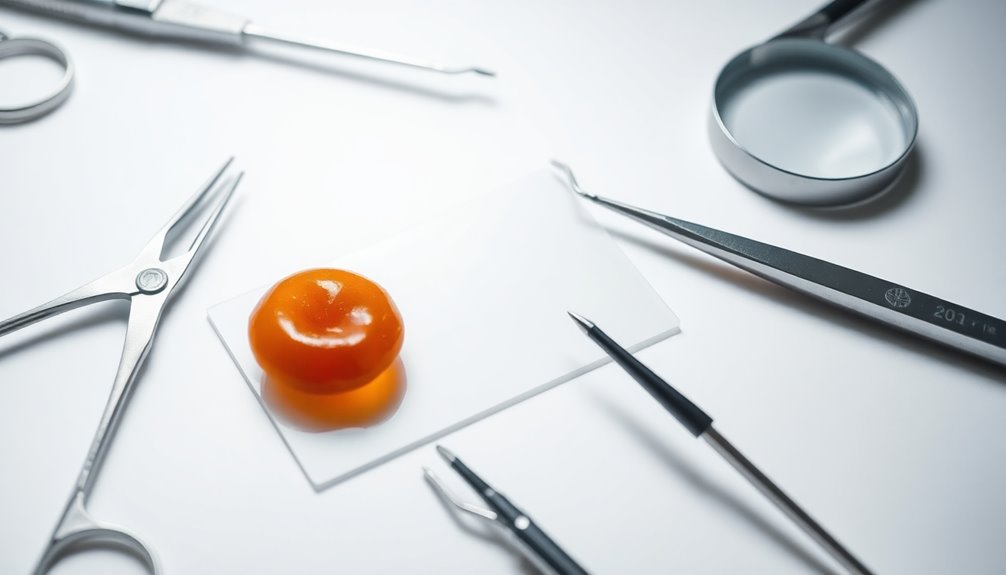
When you notice a vinegar-like smell coming from your earwax, a thorough diagnosis is key.
Your healthcare provider will likely perform a physical examination using an otoscope and may take cultures to identify any bacteria present.
They'll also ask about your hygiene habits and any symptoms to better understand the situation.
Physical Examination Techniques
A thorough physical examination of the ear is vital for diagnosing issues related to earwax and potential infections. During this process, a healthcare professional typically uses an otoscope to visualize the ear canal. This helps them assess earwax buildup and look for signs of infection that could explain any unusual smells or hearing difficulties.
As part of the physical examination, your provider checks for foreign objects or blockages that may contribute to odors or impair your hearing. They'll also take your patient history into account, which is important for understanding your hygiene practices, recent symptoms, and any underlying conditions that might affect your ear health.
If there are indications of hearing impairment due to excessive earwax or infection, audiological assessments may be conducted. This extensive evaluation guarantees that you receive appropriate treatment options tailored to your specific needs.
Cultures for Bacterial Identification
Collecting cultures for bacterial identification is a significant step in diagnosing ear infections or abnormalities related to earwax. During a physical examination, health professionals typically use swabs to gather samples from your earwax. These samples are then sent to a laboratory where cultures can grow and be analyzed for specific bacteria. This process is essential for identifying the presence of bacterial infections that might be causing discomfort or other symptoms.
Common diagnostic procedures like otoscopy allow your doctor to visually inspect the ear canal for any blockages, infections, or abnormal discharge, which can indicate bacterial activity. By examining these cultures, healthcare providers can pinpoint the exact bacteria responsible for the infection, enabling them to prescribe the most effective antibiotic treatment.
In certain cases, advanced techniques like PCR (polymerase chain reaction) may be used for rapid and accurate bacterial identification, especially in persistent ear issues.
Additionally, evaluating the composition of earwax can be supplemented with audiological evaluations to understand how a bacterial infection might be affecting your hearing abilities. Overall, accurate culture collection plays an important role in ensuring appropriate treatment and care for ear-related problems.
Patient History Assessment
Your healthcare provider's thorough assessment of your patient history is essential in diagnosing earwax-related issues. They'll ask about your hygiene practices, diet, and any recent ear symptoms to identify potential underlying causes of that vinegar-like smell.
Expect questions about the duration and intensity of any unpleasant earwax odor, along with associated symptoms such as pain, hearing loss, or smelly discharge.
It's important to share your past medical history, including previous ear infections or skin conditions, as these factors can influence earwax composition. Your provider might also inquire about exposure to foreign objects or water, which can lead to infections and contribute to earwax odor.
Additionally, documenting recent lifestyle or dietary changes, like an increase in pungent foods, can provide insight into factors affecting your ear health.
This thorough patient history assessment is crucial for determining whether earwax removal is necessary or if deeper medical issues are at play. By addressing these factors, your healthcare provider can develop a tailored plan to manage your earwax concerns effectively.
Effective Treatment Options
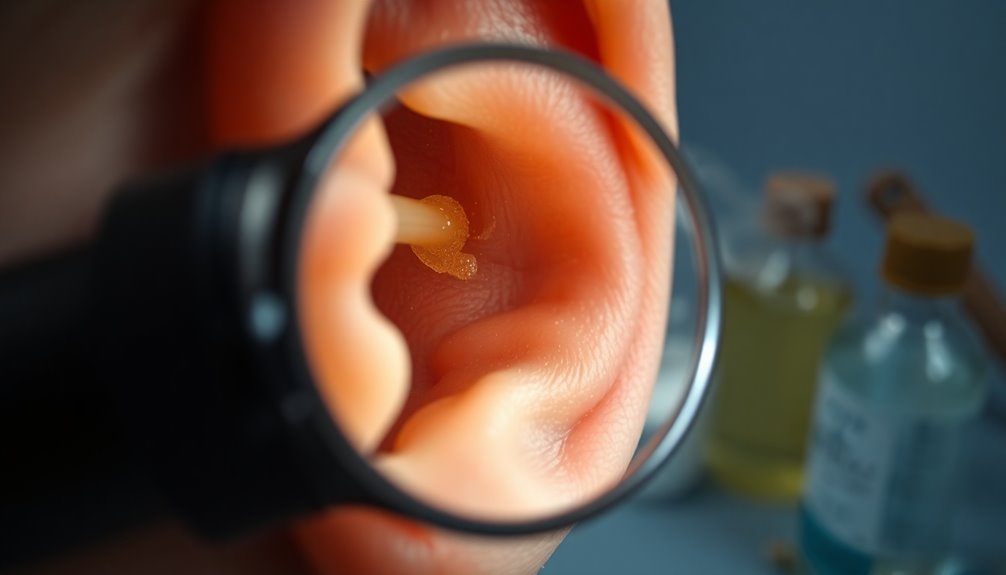
When it comes to treating earwax that smells like vinegar, you've got several effective options.
You can try home remedies, use over-the-counter solutions, or seek professional cleaning if needed.
Each method has its benefits, so let's explore what works best for you.
Home Remedies for Earwax
For those dealing with earwax buildup, home remedies can provide effective relief. Here are some options to take into account for earwax removal:
| Remedy | Description |
|---|---|
| Warm Olive or Mineral Oil | Use a few drops in your ear to soften impacted wax, making it easier to drain. |
| Hydrogen Peroxide | Mix equal parts of hydrogen peroxide and water, then use it to break down wax. |
| Over-the-Counter Ear Drops | Carbamide peroxide drops are designed to soften earwax safely at home. |
| Warm Water Irrigation | After softening, gently flush your ear with warm water to remove loosened wax. |
It's essential to maintain ear hygiene by avoiding cotton swabs, which can push wax deeper. Instead, these home remedies effectively manage earwax buildup. Always guarantee you're gentle when using these methods to prevent injury. If symptoms persist, think about consulting a healthcare professional. With these straightforward solutions, you can promote better ear health and enjoy clearer hearing.
Professional Cleaning Solutions
Many people find that professional cleaning solutions offer safe and effective treatment for earwax buildup. If you're experiencing discomfort or odor, options like microsuction can help. This method uses a gentle suction device to remove impacted wax without risking damage to your ear canals.
Another effective technique is ear irrigation, where healthcare professionals use warm water or saline to flush out excess wax. This method alleviates blockages and the associated smells you might notice.
If you have stubborn buildup, manual extraction by an ENT specialist can directly address the issue with specialized tools.
Before these treatments, your healthcare provider might recommend over-the-counter ear drops that contain hydrogen peroxide or glycerin. These can soften the wax, making the earwax removal process easier and more effective.
Regular check-ups with an audiologist or ENT are essential for monitoring your ear health. They can help address any wax-related issues before they escalate, ensuring you maintain peak hearing and hygiene.
Over-the-Counter Options
Over-the-counter options provide a convenient and effective way to manage earwax buildup at home. You can choose from various products designed to soften and remove earwax, including over-the-counter ear drops that contain glycerin or hydrogen peroxide. These drops can help break down impacted wax, making it easier to remove while also alleviating any unpleasant odors.
Earwax removal kits found in pharmacies typically combine softening drops with a bulb syringe for safe irrigation. This method effectively addresses both excess wax and the smells that may accompany it.
Additionally, regular use of ear cleaning solutions can help maintain proper ear hygiene, preventing future buildup.
If you prefer a more natural approach, some products specifically designed for earwax removal contain olive oil. This option reduces the risk of irritation while effectively working to break down stubborn wax.
Remember to follow the instructions on these treatments carefully to avoid complications like ear canal irritation or infection. By using these over-the-counter options, you can take control of your ear health and keep unpleasant odors at bay.
Prevention Strategies for Healthy Ears
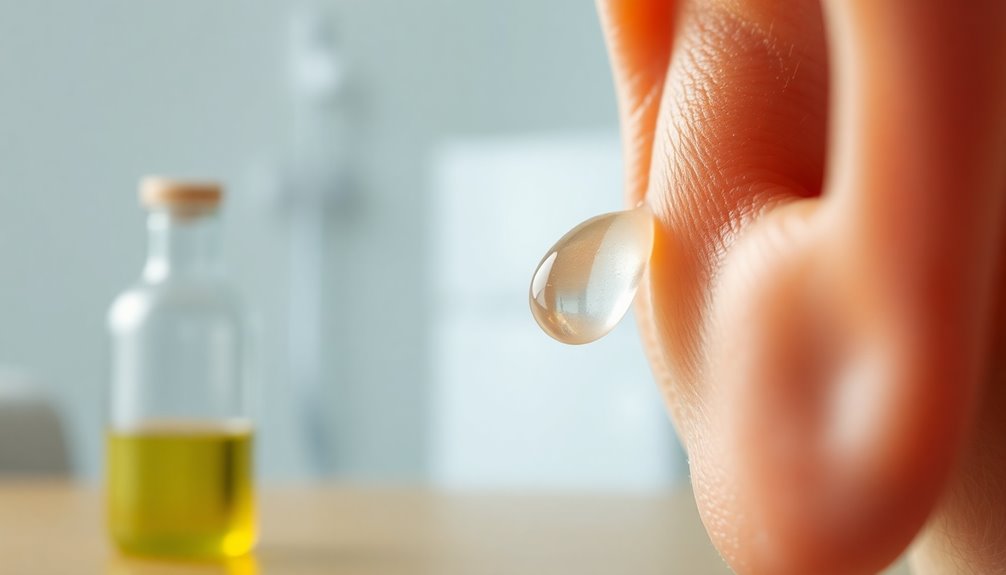
To maintain healthy ears and prevent unpleasant odors associated with earwax, regular ear hygiene is essential. Here are some effective prevention strategies to keep your ears clean and odor-free:
| Strategy | Description | Benefits |
|---|---|---|
| Regular Cleaning | Gently clean the outer ear with a damp cloth. | Reduces excess wax buildup. |
| Stay Hydrated | Drink plenty of water to maintain earwax consistency. | Prevents dry, foul-smelling wax. |
| Avoid Inserting Objects | Don't use cotton swabs or other objects in your ears. | Prevents blockages and deeper wax push. |
| Limit Odor-Inducing Foods | Cut back on foods like garlic and spicy dishes. | Maintains a neutral earwax smell. |
| Schedule Regular Check-ups | Visit your healthcare provider for ear evaluations. | Aids in early detection of issues related to ear wax removal. |
Implementing these strategies will not only keep your ears clean but also help avoid excess wax and unpleasant odors. Regular check-ups are key for monitoring your ear health, ensuring that you maintain ideal ear hygiene.
Impact of Earwax on Hearing

Excess earwax can block your ear canal, making sounds seem muffled or even leading to temporary hearing loss.
If your earwax smells off, it might signal an infection that could further impact your hearing.
That's why regular cleaning is essential to guarantee your ears function properly and stay healthy.
Earwax Blockages and Hearing
When earwax builds up and forms a blockage in the ear canal, it can greatly impact your hearing. You might notice symptoms like hearing loss, a feeling of fullness in your ear, or even tinnitus. This blockage prevents sound from traveling effectively, often resulting in muffled hearing. If you've experienced a sudden change in your ability to hear, it could be due to earwax blocking your ear canal.
Moreover, a buildup of earwax can trap moisture, which may lead to a bad smell and increase the risk of ear infections. These infections can further compromise your hearing, making it important to address any blockages promptly.
Regular earwax removal is essential; chronic blockages can potentially lead to irreversible hearing loss if left untreated.
If you find yourself struggling with hearing issues, it's wise to consult a healthcare professional. They may recommend an audiological assessment to evaluate your situation and determine the best course of action.
Don't ignore the signs—taking care of your earwax is significant for maintaining clear and healthy hearing.
Smelly Earwax and Infections
Smelly earwax can signal an underlying ear infection, which may come with symptoms like earache and hearing difficulties. When earwax develops a foul or vinegar-like odor, it often indicates the presence of bacteria and debris, resulting from an infection. This accumulation can lead to discomfort and even more serious issues if left unchecked.
Blocked earwax traps moisture in the ear canal, creating the perfect breeding ground for bacteria. As these infections progress, you might notice increased drainage and persistent odors, which should never be ignored.
Regular earwax removal is vital for maintaining hearing health; excessive buildup not only impairs your ability to hear but can also cause further complications.
If you notice that your earwax has a persistent unpleasant smell, it's important to seek medical evaluation. A healthcare professional can determine if there's an infection present and recommend appropriate treatment.
Don't wait for symptoms to worsen—addressing smelly earwax promptly can help prevent hearing loss and guarantee your ears remain healthy. Remember, taking care of your earwax is an important step in maintaining overall ear health.
Regular Cleaning Importance
Regularly cleaning your ears is essential for preventing earwax buildup, which can greatly impact your hearing. When earwax accumulates, it can lead to blockages that obstruct sound waves from reaching your eardrum, causing symptoms like muffled hearing or even pain. Approximately 10% of the general population experiences conductive hearing loss due to impacted earwax, emphasizing the need for good ear hygiene.
| Impact of Earwax | Symptoms of Buildup | Importance of Cleaning |
|---|---|---|
| May cause conductive hearing loss | Muffled sounds | Prevents blockages |
| Traps moisture and bacteria | Earache | Reduces risk of infections |
| Creates barriers for sound | Tinnitus | Maintains overall ear hygiene |
Myths About Earwax and Hygiene
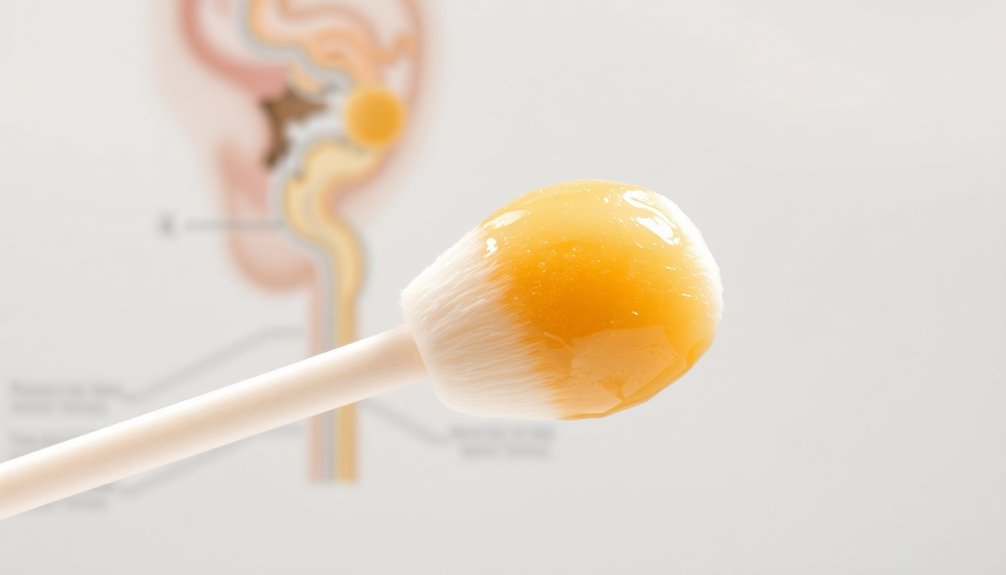
Many people hold misconceptions about earwax and hygiene, believing it to be something dirty that needs to be completely eliminated. In reality, earwax serves essential protective functions in your ear canal, including lubrication and infection prevention. Over-cleaning the ear can actually lead to impaction, pushing wax deeper instead of removing it.
You might also think that the color of earwax indicates poor hygiene, but that's a myth. Earwax color varies naturally and doesn't always correlate with cleanliness. Additionally, don't assume that earwax issues are exclusive to older adults; they can affect anyone, regardless of age, especially those with conditions impacting earwax production or clearance.
Cultural perspectives on earwax also differ considerably. In some cultures, earwax is viewed as a sign of health, contrasting sharply with the common Western notion that it should be eradicated.
Frequently Asked Questions
Why Does My Ear Wax Smell Vinegary?
If your earwax smells vinegary, it could indicate a bacterial infection or an imbalance in your ear's environment.
Moisture accumulation from swimming or bathing might encourage bacteria to thrive, producing that sour odor. Skin conditions like eczema can also alter the smell.
Additionally, your diet could play a role; certain foods might affect how your earwax smells.
If the smell persists or you notice other symptoms, it's best to consult a healthcare professional.
Why Does My Ear Wax Smell Sour?
"You are what you eat," they say, and that applies to your earwax too.
If your earwax smells sour, it could be due to moisture trapped in your ear canal or an accumulation of bacteria.
Poor hygiene practices or certain foods might also contribute to this odor.
If you notice additional symptoms like pain or discharge, it's wise to consult a healthcare professional for a thorough evaluation.
Don't ignore those signs!
Why Did a Clump of Earwax Fall Out?
A clump of earwax might fall out because your body is naturally pushing out old wax as new wax forms.
Factors like humidity and how you clean your ears can affect this process. Sometimes, an impacted clump dislodges suddenly, indicating it's been stuck for a while.
Maintaining regular ear hygiene helps prevent excessive buildup, but if you notice unusual smells or pain, it's best to consult a healthcare professional.
Why Does My Earwax Smell Like Salt and Vinegar Chips?
Isn't it ironic that something as mundane as earwax can smell like your favorite snack?
If your earwax has that distinct salt and vinegar chip scent, it might point to bacteria at work.
Dietary choices can also play a role, as certain foods influence your body's chemistry.
If the smell persists or you experience discomfort, it's wise to consult a doctor.
After all, your ears deserve the same care as your taste buds!
Conclusion
So, the next time you notice that vinegar-like scent coming from your ears, don't panic! Picture your earwax as a tiny shield, protecting your ear canal from harm. While it might have a peculiar smell, understanding its composition and causes can help you take charge of your ear health. Remember, a little awareness goes a long way in keeping your ears happy and hearing clear, so stay proactive and don't hesitate to seek help when needed!
